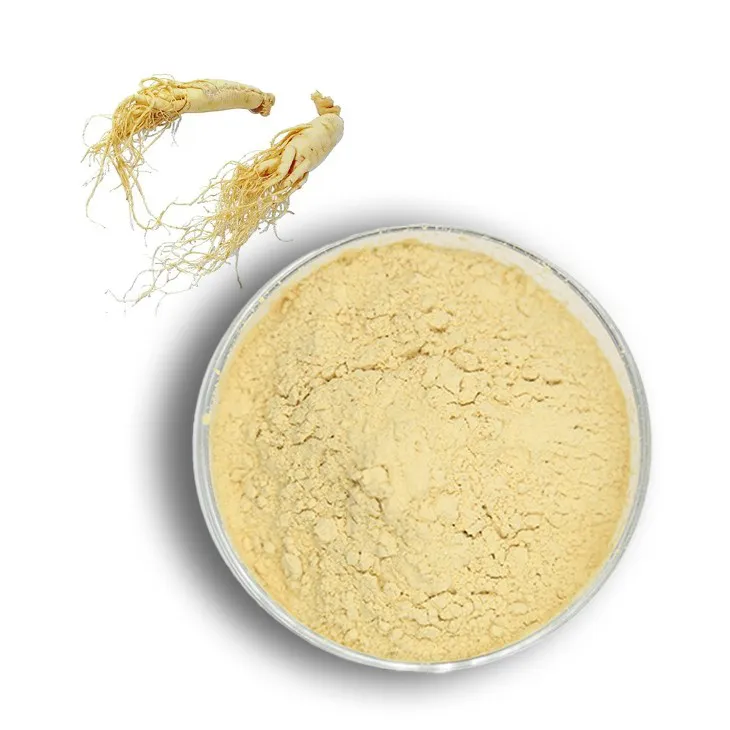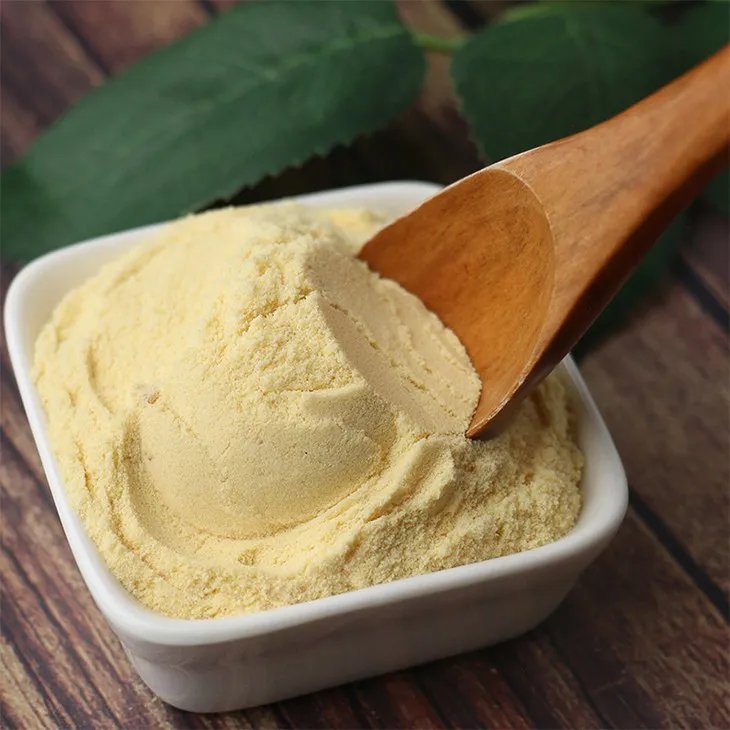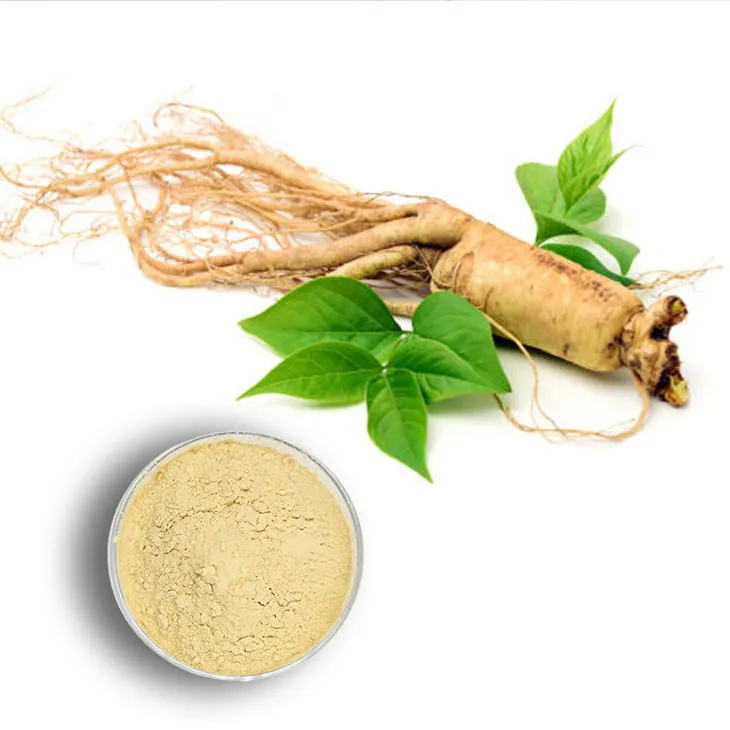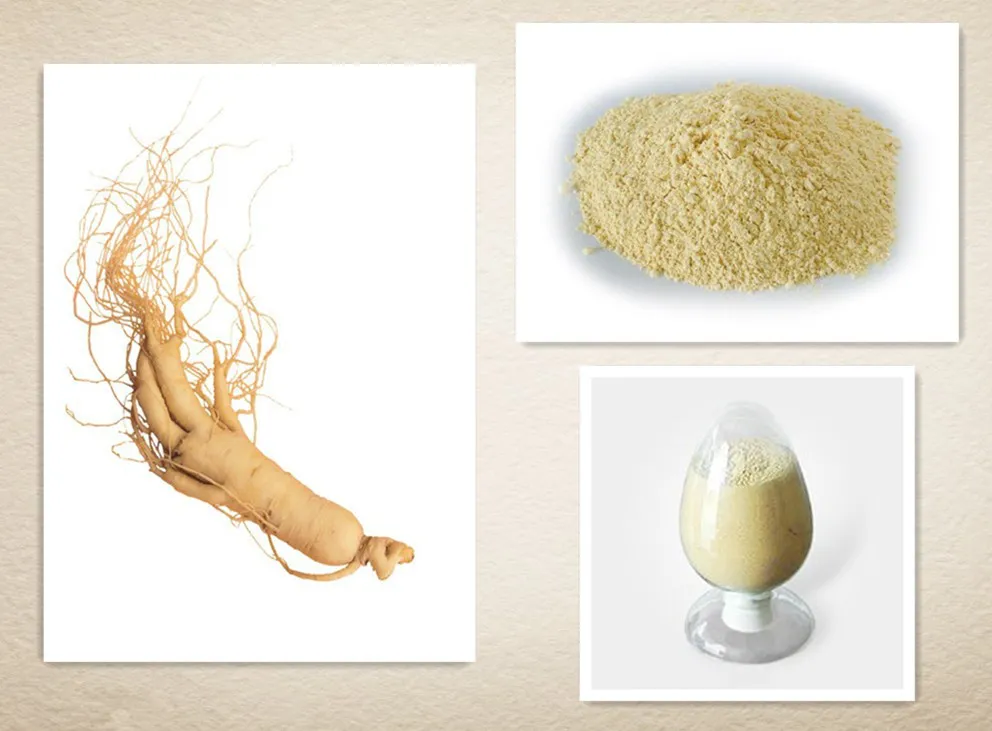- 0086-571-85302990
- sales@greenskybio.com
What is ginseng root extract and why use it on the skin?
2024-11-13

1. Introduction to Ginseng Root Extract
Ginseng, a renowned plant in traditional medicine, has been used for centuries in various cultures. Ginseng Root Extract is obtained from the roots of the ginseng plant through a series of extraction processes. It contains a rich blend of active compounds, such as ginsenosides, polysaccharides, flavonoids, and amino acids.
Ginsenosides are considered the most important components in Ginseng Root Extract. They are steroid - like compounds that contribute to many of the extract's beneficial properties. The different types of ginsenosides present in ginseng can vary depending on the species of ginseng (for example, Panax ginseng, American ginseng, etc.) and the extraction method used.

2. Adaptogenic Properties and Skin Stress Adaptation
One of the remarkable features of ginseng root extract is its adaptogenic properties. Adaptogens are substances that help the body (in this case, the skin) to adapt to various stressors more effectively.
2.1 Environmental Stressors
Our skin is constantly exposed to environmental stressors like ultraviolet (UV) radiation, pollution, and changes in temperature and humidity. These stressors can damage the skin cells, leading to premature aging, dullness, and other skin problems.
Ginseng root extract can enhance the skin's natural defense mechanisms. For instance, it can stimulate the production of antioxidant enzymes within the skin cells. Antioxidant enzymes, such as superoxide dismutase (SOD) and catalase, play a crucial role in neutralizing free radicals. Free radicals are highly reactive molecules that are generated as a result of environmental stressors and can cause oxidative damage to the skin.
2.2 Internal Stressors
In addition to external stressors, our skin can also be affected by internal stressors like hormonal imbalances, lack of sleep, and poor diet. Ginseng root extract may help to regulate the skin's response to these internal stressors as well.
Studies have shown that ginseng can modulate the activity of the hypothalamic - pituitary - adrenal (HPA) axis, which is involved in the body's stress response. By influencing this axis, ginseng root extract may indirectly affect the skin's condition, for example, by reducing stress - related skin breakouts or inflammation.

3. Skin Tone Brightening
Another reason for using ginseng root extract on the skin is its ability to brighten the skin tone.
3.1 Melanin Inhibition
Melanin is the pigment responsible for the color of our skin, hair, and eyes. However, excessive production of melanin can lead to hyperpigmentation, which can cause dark spots, uneven skin tone, and dullness.
Ginseng root extract has been found to inhibit the production of melanin to some extent. It can act on the melanocytes (the cells that produce melanin) and interfere with the enzymatic processes involved in melanin synthesis. For example, some of the ginsenosides in the extract may inhibit the activity of tyrosinase, an enzyme that is crucial for melanin production.
3.2 Skin Cell Turnover
Ginseng root extract can also promote skin cell turnover. As skin cells age, they become dull and accumulate on the surface of the skin, contributing to a lackluster complexion. By accelerating the turnover of skin cells, ginseng root extract helps to remove these old, dead cells and reveals the fresh, new cells underneath, resulting in a brighter and more radiant skin tone.

4. Nourishing the Skin
The nourishing qualities of ginseng root extract are beneficial for improving the overall texture of the skin.
4.1 Hydration
Proper hydration is essential for healthy - looking skin. Ginseng root extract can help to improve the skin's water - holding capacity. It can stimulate the production of hyaluronic acid within the skin. Hyaluronic acid is a natural substance that can bind a large amount of water, keeping the skin hydrated and plump.
Moreover, ginseng root extract can strengthen the skin's barrier function. A healthy skin barrier is able to prevent water loss from the skin and protect it from external irritants. By enhancing the skin barrier, ginseng root extract contributes to better - hydrated skin.
4.2 Anti - Aging Effects
As we age, the skin loses its elasticity and firmness due to a decrease in collagen and elastin production. Ginseng root extract can help to combat these signs of aging.
It can stimulate the synthesis of collagen and elastin in the skin. Collagen provides structural support to the skin, while elastin gives it elasticity. By increasing the production of these two proteins, ginseng root extract can reduce the appearance of wrinkles and fine lines, making the skin look smoother and more youthful.
Furthermore, ginseng root extract has anti - inflammatory properties. Chronic inflammation in the skin can accelerate the aging process. By reducing inflammation, ginseng root extract can help to maintain the skin's health and slow down the development of age - related skin problems.

5. Other Potential Benefits for the Skin
5.1 Acne Treatment
Ginseng root extract may have potential benefits in treating acne. Its anti - inflammatory properties can help to reduce the redness and swelling associated with acne lesions. Additionally, it can regulate sebum production in the skin. Excessive sebum production can clog pores and lead to acne breakouts. By controlling sebum production, ginseng root extract may prevent the formation of acne.
5.2 Wound Healing
Some studies suggest that ginseng root extract can promote wound healing in the skin. It can stimulate the proliferation of fibroblasts, which are cells responsible for producing the extracellular matrix during wound healing. The extracellular matrix provides a framework for new tissue growth, so by promoting fibroblast proliferation, ginseng root extract can accelerate the wound - healing process.

6. How to Use Ginseng Root Extract on the Skin
6.1 Skincare Products
Ginseng root extract is commonly found in a variety of skincare products. These include creams, serums, masks, and lotions.
When choosing a skincare product containing ginseng root extract, it is important to check the ingredient list carefully. Look for products that list ginseng root extract high on the ingredient list, as this indicates a higher concentration of the extract in the product.
It is also advisable to choose products from reputable brands that follow good manufacturing practices. This ensures the quality and safety of the product.
6.2 DIY Applications
For those who prefer a more natural approach, ginseng root extract can also be used in DIY skincare applications.
One way is to make a ginseng root extract toner. To do this, you can soak a small piece of ginseng root in distilled water for a few days. Then, strain the liquid and use it as a toner on your skin using a cotton pad.
Another option is to make a ginseng root extract face mask. You can mix ginseng root powder with other natural ingredients such as honey, yogurt, or aloe vera to create a paste. Apply the paste to your face and leave it on for 15 - 20 minutes before rinsing off.
7. Precautions and Considerations
While ginseng root extract has many potential benefits for the skin, there are also some precautions and considerations to keep in mind.
7.1 Allergic Reactions
Some people may be allergic to ginseng root extract. Before using any product containing ginseng root extract on your skin, it is advisable to do a patch test. Apply a small amount of the product to a small area of skin on your forearm and wait for 24 - 48 hours to see if there is any allergic reaction, such as redness, itching, or swelling.
7.2 Interaction with Other Ingredients
Ginseng root extract may interact with other ingredients in skincare products. For example, it may enhance or interfere with the effectiveness of certain active ingredients. It is important to be aware of these potential interactions when using products that contain ginseng root extract in combination with other ingredients.
7.3 Pregnant and Nursing Women
Pregnant and nursing women should be cautious when using products containing ginseng root extract. Although there is limited research on the safety of ginseng root extract during pregnancy and lactation, it is best to consult a healthcare provider before using such products.
FAQ:
Q1: What are the main components in ginseng root extract that are beneficial for the skin?
Ginseng root extract contains various components beneficial for the skin, such as ginsenosides. Ginsenosides are known for their antioxidant, anti - inflammatory, and anti - aging properties. They can help protect the skin from free radical damage, reduce inflammation, and promote cell regeneration.
Q2: Can ginseng root extract be used for all skin types?
Generally, ginseng root extract can be used for most skin types. For dry skin, it provides nourishment and hydration, improving the skin's moisture level. For oily skin, its anti - inflammatory properties can help soothe the skin and reduce sebum production. However, those with extremely sensitive skin may need to do a patch test first as some individuals may be allergic to it.
Q3: How does ginseng root extract inhibit melanin production?
Ginseng root extract may inhibit melanin production through various mechanisms. It can interfere with the enzymatic activity involved in melanin synthesis. For example, it may affect tyrosinase, an enzyme crucial for melanin formation. By reducing the activity of such enzymes, it can limit the amount of melanin produced, thus helping to brighten the skin tone.
Q4: Is ginseng root extract safe to use on the skin?
When used properly, ginseng root extract is generally safe for skin use. However, as with any skincare ingredient, some people may experience allergic reactions. It is advisable to choose products with ginseng root extract from reliable brands. Also, if any irritation occurs during use, stop using it immediately and consult a dermatologist if necessary.
Q5: How long does it take to see the effects of ginseng root extract on the skin?
The time it takes to see the effects of ginseng root extract on the skin can vary. Some people may notice a slight improvement in skin tone and texture within a few weeks of regular use. However, for more significant changes, such as a reduction in fine lines and wrinkles, it may take several months of consistent use, depending on factors like the concentration of the extract in the product and individual skin conditions.
Related literature
- The Benefits of Ginseng Root Extract in Skincare"
- "Ginseng and Skin Health: A Comprehensive Review"
- "The Role of Ginseng Root Extract in Skin Adaptation to Environmental Stress"
- ▶ Hesperidin
- ▶ citrus bioflavonoids
- ▶ plant extract
- ▶ lycopene
- ▶ Diosmin
- ▶ Grape seed extract
- ▶ Sea buckthorn Juice Powder
- ▶ Beetroot powder
- ▶ Hops Extract
- ▶ Artichoke Extract
- ▶ Reishi mushroom extract
- ▶ Astaxanthin
- ▶ Green Tea Extract
- ▶ Curcumin Extract
- ▶ Horse Chestnut Extract
- ▶ Other Problems
- ▶ Boswellia Serrata Extract
- ▶ Resveratrol Extract
- ▶ Marigold Extract
- ▶ Grape Leaf Extract
- ▶ blog3
- ▶ blog4
- ▶ blog5
-
Organic Tongkat Ali extract powder factory.
2024-11-13
-
How to make powder with ashwagandha extract.
2024-11-13
-
Rosehip extract manufacturers from China.
2024-11-13
-
The best cat's claw extract in nature.
2024-11-13
-
Chinese Dandelion Leaf Extract Suppliers.
2024-11-13
-
Red Wine Extract
2024-11-13
-
Saw Palmetto Extract
2024-11-13
-
Hericium erinaceus extract powder
2024-11-13
-
Elderberry Extract
2024-11-13
-
Nettle Root Extract
2024-11-13
-
Green coffee bean Extract
2024-11-13
-
Mangosteen extract powder
2024-11-13
-
Lotus leaf extract
2024-11-13
-
Chia Seed Powder
2024-11-13
-
Polygonum Cuspidatum Extract
2024-11-13





















